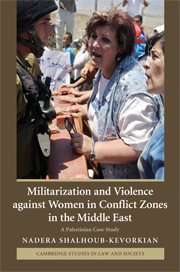 Militarization and Violence against Women in Conflict Zones in the Middle East
Militarization and Violence against Women in Conflict Zones in the Middle East Book contents
- Frontmatter
- Contents
- List of figures
- Acknowledgements
- 1 Introduction
- 2 Violent translations: women, war, and narrative in conflict zones
- 3 Veiled powers: conceptualizing woman and/as the ‘nation’
- 4 Women frontliners in conflict zones: a genealogy of weaponization
- 5 Speaking truth to power: voices of Palestinian women facing the Wall
- 6 Ruminations and final thoughts: women in-between
- References
- Index
4 - Women frontliners in conflict zones: a genealogy of weaponization
Published online by Cambridge University Press: 23 January 2010
- Frontmatter
- Contents
- List of figures
- Acknowledgements
- 1 Introduction
- 2 Violent translations: women, war, and narrative in conflict zones
- 3 Veiled powers: conceptualizing woman and/as the ‘nation’
- 4 Women frontliners in conflict zones: a genealogy of weaponization
- 5 Speaking truth to power: voices of Palestinian women facing the Wall
- 6 Ruminations and final thoughts: women in-between
- References
- Index
Summary
They used us as silah bashari [as a human weapon] … They asked the men to walk naked so as to be able to further invade areas, and then asked me and all the women in our neighbourhood to walk in front of their [i.e., Israeli] tanks, and walk them out of [the] neighbourhood. While men were watching … the women became a new Zionist weapon to fight us.
(Suraida from Jenin, May 2002)When they invaded Jenin, they were using their amplifiers to scare us, they threatened to violate our honour. As in 1948 during the Nakba, they used women's honour to spread fear, but where are the Arabs, where is the world? Even our honour was used as a weapon against us … but Umrna Ma Istaslamna [we never surrendered].
(Rania from Jenin, May 2002)Soon after midnight. Those who were patrolling our village saw the Israelis come to us like rain. They flooded the village. They came from an entire circle surrounding us.
That night, my husband was working in the King David Hotel. I had my son, Mahmoud, four months old … The attack began at about one o'clock in the morning. I was lying down and I was breast-feeding Mahmoud when I heard the tanks and rifles, and smelled the smoke. I saw them coming. Everybody was yelling to his or her neighbours, ‘If you know how to leave, leave!’ … I had my baby in one arm, and I crawled on the floor against the wall until I could get down from the third floor and out of my house. […]
- Type
- Chapter
- Information
- Militarization and Violence against Women in Conflict Zones in the Middle EastA Palestinian Case-Study, pp. 112 - 149Publisher: Cambridge University PressPrint publication year: 2009
